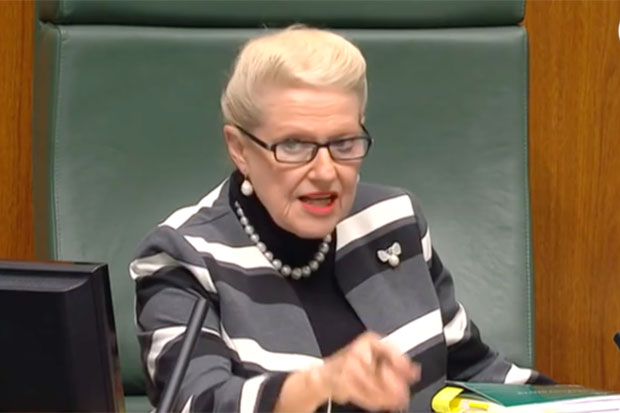Now starts the analysis and allocation of blame for Bronwyn Bishop’s fall from grace.
The Australian public has passed judgement. Even before the latest revelations about her spending $6000 to charter a plane for the 160km trip from Sydney to Nowra, only 19 per cent of Australians believed she should remain as Speaker.
We don’t know the reasoning behind the public’s disapproval: it is most probably about her extravagance and the impression (possibly correct) that some of her travel was for personal rather than official purposes. Like Bavaria’s Mad King Ludwig, it seems she saw the public purse as a source to fund personal entitlements.
Those with more than a passing interest in politics may be basing their disapproval on her blatant partisanship from the Speaker’s chair (319 ejections of Labor MPs, 5 ejections of Coalition MPs), and her attendance at Liberal Party fundraising events.

Tony Abbott, a colleague from the far-right faction of the NSW Liberal Party and fellow monarchist, has come to her defence, seeing the problem in the rules about politicians’ “entitlements” (a strange term to describe what any corporation would call “business expenses”). He has announced a “root and branch" review of the rules governing politicians’ expenses, calling for “a system that is simple, effective and clear”.
There should of course be clear and simple rules regarding expenses. Most corporations manage it, and most people who travel or incur other expenses as part of their work have a reasonable idea of what constitutes a reasonable expense and what constitutes rorting.
Similarly for politicians, there should be a clear understanding of the difference between expenses incurred in attending to the public purpose and those expenses that serve other purposes. It isn’t hard to see which side of the line attending a colleague’s wedding falls, for instance.
One impediment to developing such a simple understanding is that in our Westminster winner-take-all system the capacity to allocate administrative resources is seen as one of the spoils of office.
Official travel is just one small (but visible) area where abuse is possible. Less visible is the appropriation by executive government of the resources of the public service for political purposes.
Taxpaying voters would be outraged if ever they realised how much of the work of public servants, particularly highly-paid senior public servants, is spent in drafting speeches for ministers, preparing briefs for ministers to respond to Opposition questions, drafting letters for ministers to respond to constituents (usually in such a way as to deflect legitimate criticism), helping ministers get out of political trouble and doing other work of a partisan nature.
We shouldn’t expect Abbott’s review to go into this territory, nor should we expect Labor to press for it to do so, because they know their turn will come to enjoy the spoils of office.
So in this context Bronwyn Bishop’s behaviour is not entirely unreasonable. It’s her misfortune that her expenses are more in the public eye than those of government ministers.
The other contextual factor giving some justification to her behaviour is her own party’s philosophy on public expenditure. The Liberal Party platform states clearly that “businesses and individuals – not government – are the true creators of wealth and employment.”
Taken to its logical conclusion this means that governments create no value, and that all public expenditure is wasteful. Spending money on a helicopter trip, a school, the CSIRO, the Bruce Highway, a charter flight to Nowra, is all the same unproductive waste. If Christopher Pyne can waste billions on education and Sussan Ley can waste billions on health care, why can’t Bronwyn Bishop waste a few thousand dollars on charter flights?
That philosophy – a philosophy that fails to acknowledge the value of government services – explains a great deal about the Abbott Government’s poor performance on economic management, because it has no notion of the economic role of government. Bronwyn Bishop’s extravagance is just one small manifestation of that shortcoming.
Donate To New Matilda
New Matilda is a small, independent media outlet. We survive through reader contributions, and never losing a lawsuit. If you got something from this article, giving something back helps us to continue speaking truth to power. Every little bit counts.




